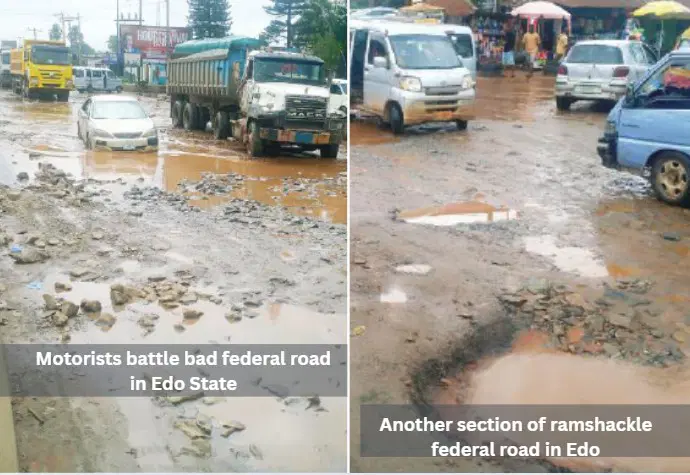Now Reading: Nigeria’s Federal Highways of Horror: Travellers Trapped as Collapsed Roads Worsen Nationwide
-
01
Nigeria’s Federal Highways of Horror: Travellers Trapped as Collapsed Roads Worsen Nationwide
Nigeria’s Federal Highways of Horror: Travellers Trapped as Collapsed Roads Worsen Nationwide

Across Nigeria, travellers are groaning under the weight of failed federal highways that have turned once-busy trade routes into death traps. An investigation by Vanguard reporters across the six geopolitical zones reveals a grim pattern of neglect, crumbling infrastructure, and rising fatalities.
From Lagos to Maiduguri and Port Harcourt to Minna, deep craters, washed-out bridges, and abandoned road projects have made inter-state travel a nightmare. What were once smooth arteries of commerce and mobility have degenerated into ditches of despair.
According to findings, over 80% of reported road crashes across the country are now linked to poor road conditions and ineffective maintenance. Erosion, flooding, and shoddy rehabilitation work have left many highways nearly impassable, especially during the rainy season.
A Country on Crumbling Roads
Federal roads, which connect states and regions, form the backbone of Nigeria’s transport system. The country boasts more than 108,000 kilometres of paved roads, but years of neglect and inadequate maintenance have left many in ruins.
Long stretches of the Calabar-Itu Highway in Cross River, the Lagos-Sagamu-Ibadan Expressway, and the Lagos-Badagry Road now resemble disaster zones. In Lagos, parts of the Agege Motor Road — notably Mushin-Olosha, Bolade-Oshodi, and Dorman Long sections — have become notorious for traffic jams, accidents, and robberies.
Residents told Vanguard that despite contractors moving to sites and some palliative works being done, many sections remain deplorable. Granite fillings used to patch potholes have worsened the driving experience, while rainwater washes away temporary repairs within weeks.
Lives Lost, Businesses Crippled
For many Nigerians, these roads are more than just transportation routes — they are lifelines. Yet, thousands of motorists, traders, and commuters face daily hardship, with some abandoning their businesses or relocating due to the worsening conditions.
Mr. Adeoye Bilesanmi, a resident of Olosha in Lagos, lamented that hoodlums now exploit the gridlock caused by bad roads to rob motorists, especially at night. “We are no longer safe. The bad roads give criminals an advantage,” he said.
Government Response: ‘We’re Doing Our Best’
Officials from the Federal Ministry of Works say efforts are ongoing to fix critical sections of federal highways across the country. However, road users argue that the pace of work remains slow, and most interventions are short-lived.
Experts warn that without urgent, sustained investment and stricter monitoring of contractors, the federal highway system could collapse entirely — further strangling Nigeria’s economy and endangering lives.
As commuters battle potholes and broken bridges daily, frustration mounts. For now, the reality remains grim: the highways that once united the nation are now highways of horror.




